NCITE Explains: New Orleans Terrorist Attack
Terrorism in New Orleans cast a shadow over the first week of the new year. NCITE research helps explain how and why.
- search keywords:
- new orleans
- terrorism
- IED
- islamic state

About 3 a.m. on New Year's Day, a man drove a rented pickup truck into a crowd of revelers on Bourbon Street in New Orleans, Louisiana, killing 14 people and injuring more than 30. The driver was later killed in a shootout with police.
WHO |
WHY |
HOW |
| Authorities have identified the attacker as Shamsud-Din Jabbar, 42, a U.S. Army veteran from Texas. The FBI has said Jabbar acted alone. | Jabbar posted five videos to social media prior to the attack that declared his support for the Islamic State. Authorities also recovered a black Islamic State flag from the pickup. | Jabbar used the truck, rented on the carshare service Turo, to ram through crowds on Bourbon Street before engaging in a shootout with police. Authorities also believe Jabbar placed explosive devices in the area. |
Published by NCITE
Meta’s Glasses, ChatGPT, and the Rise of High-Tech Extremist Violence
NCITE's Sam Hunter, Joel Elson, and Austin Doctor discuss the role Meta's smart glasses played in the New Orleans attack and how it reflects a broader trend of terrorists embracing emerging technologies.
Lawfare: On New Orleans, Las Vegas, Virginia, and the Threat of Improvised Explosive Devices
NCITE's Austin Doctor writes on the enduring appeal of the IED for terrorists across ideology. "As the terrorism landscape changes, the U.S. counterterrorism workforce faces new challenges in assessing, preventing, and responding to the terrorist IED threat. Looking ahead, efficient and effective solutions will require close attention to the evolving human and technical dimensions underlying the terrorist IED threat," he writes.
New Orleans Terror Attack: An Overview of ISIS Support in America
NCITE's Seamus Hughes gives an overview of support for the Islamic State in the United States. "All told, the number of ISIS supporters in the U.S. is statistically small, though actions of the few have had an outsized effect on public perception and government policy. For the last decade, the FBI has consistently said in public remarks that it has more than 1,000 active ISIS investigations in all 50 states," he writes.
NCITE in the News
- NBC: Meta smart glasses worn by New Orleans attacker
- KETV 7: Local Insight on the New Orleans Terror Attack
- CNN: Authorities have charged at least 3 other alleged ISIS sympathizers in recent months
- BBC News: The Context, Jan. 2, 2025
- BBC Audio: New Orleans: Biden says attacker had a "desire to kill"
- The Independent: The New Orleans attacker was inspired by ISIS. How much of a threat does the group pose to the US?
- 13 News: Experts: ISIS uses social media to radicalize Americans to commit acts of terror
- Voice of America: Islamic State group-inspired New Orleans attack revives familiar fears
- CBC: How ISIS may have inspired the deadly truck attack in New Orleans
- Newsweek: Could FBI Have Prevented New Orleans Terror Attack?
- ABC 13: FBI returns to Houston home of New Orleans terror attack suspect
- NBC: ‘A perfect storm’: Extremism online and political polarization are increasing the risk of attacks, experts say
- WWL First News: How do people become radicalized? Can we DE-radicalize them?
- George Mason University: Chaos on Bourbon Street: The Growing Threat of 'Rampage Terrorism'
Related NCITE Research
Novel Technology Usage
The use of a peer-to-peer carsharing service in the attack raises questions about how terrorists take advantage of new technologies. NCITE has produced research that examines this issue in relation to many emerging technologies, including the AR/VR metaverse, artificial intelligence, cryptocurrencies, and more.
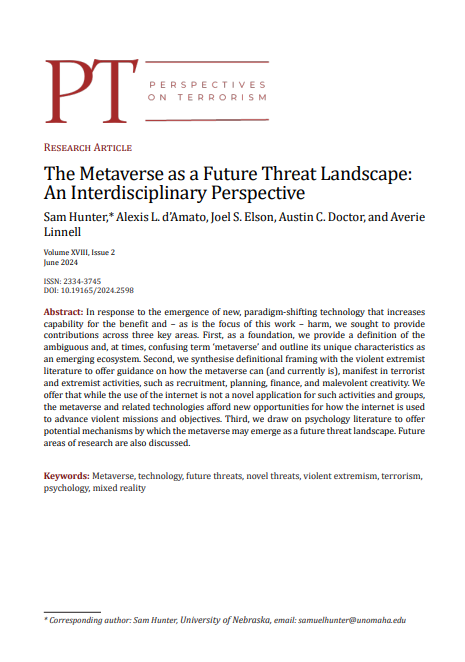 |
The Metaverse as a Future Threat LandscapeSam Hunter, University of Nebraska at Omaha Published in Perspectives on Terrorism, this report discusses how terrorists could use the metaverse to recruit for, plan, and finance activities. |
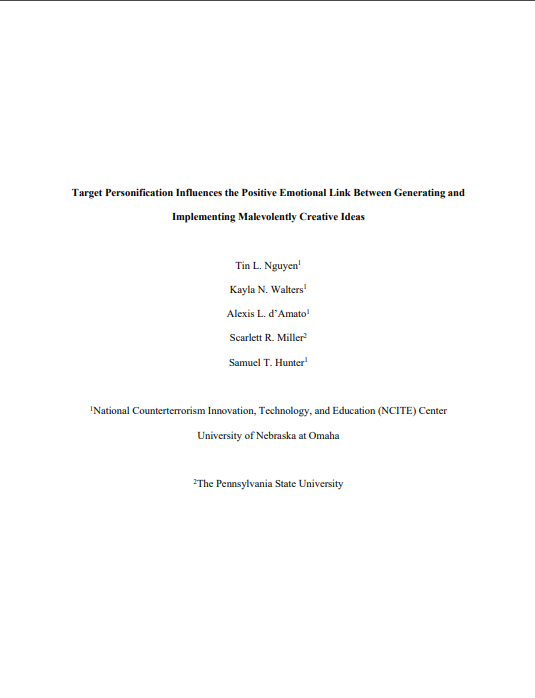 |
Target Personification Influences the Positive Emotional Link Between Generating and Implementing Malevolently Creative IdeasTin L. Nguyen, University of Nebraska at Omaha This report discusses the link between generating and implementing malevolently creative ideas. |
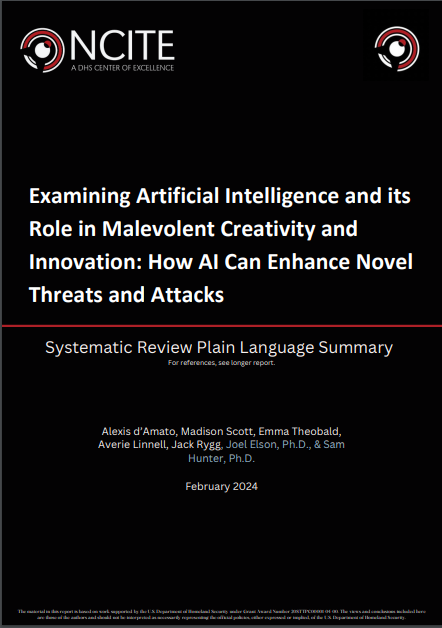 |
Examining Artificial Intelligence and its Role in Malevolent Creativity and Innovation: How AI Can Enhance Novel Threats and AttacksAlexis d'Amato, University of Nebraska at Omaha This summary explores how AI can influence the creative process and could be used by terrorists to find new ways of causing harm. |
 |
Financing Violent ExtremismMarc-André Argentino, King's College London This workbook examines how terrorists could use cryptocurrencies and other financial technologies to finance their operations. |
Improvised Explosive Device (IED) Usage
The attacker's intended use of explosives highlights the importance of understanding and countering the terrorist IED threat.
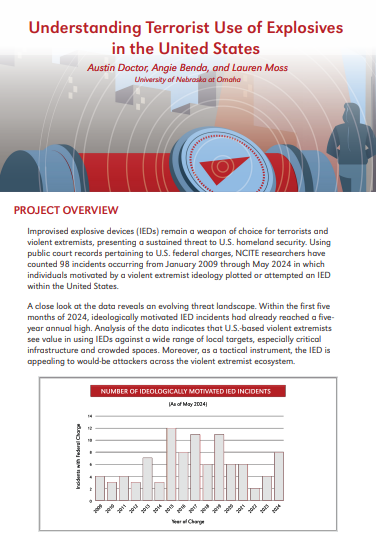 |
Understanding Terrorist Use of Explosives in the United StatesAustin Doctor, University of Nebraska at Omaha This report outlines trends relating to terrorist use of IEDs over the past decade, including the average age and motivating ideology of attackers. |
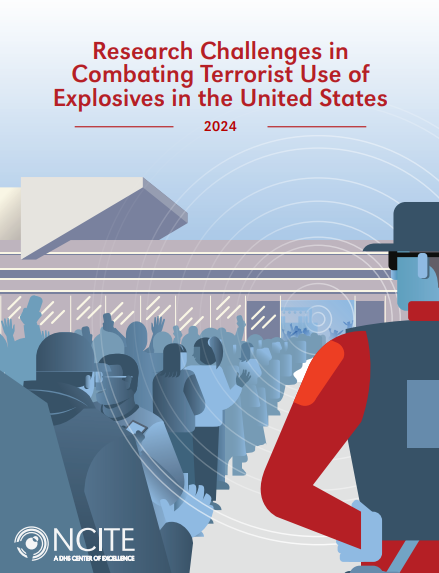 |
Research Challenges in Combating Terrorist Use of Explosives in the United States – 2024Austin Doctor, University of Nebraska at Omaha This report, published in 2024, identifies 10 key challenge areas for addressing the current and future terrorist IED threat. |
Preventing Future Attacks
The Nationwide Suspicious Activity Reporting (SAR) Initiative is one of many tools used by law enforcement to help prevent terrorism and terrorism-related activity. NCITE has developed an expansive set of research on this pathway to prevention.
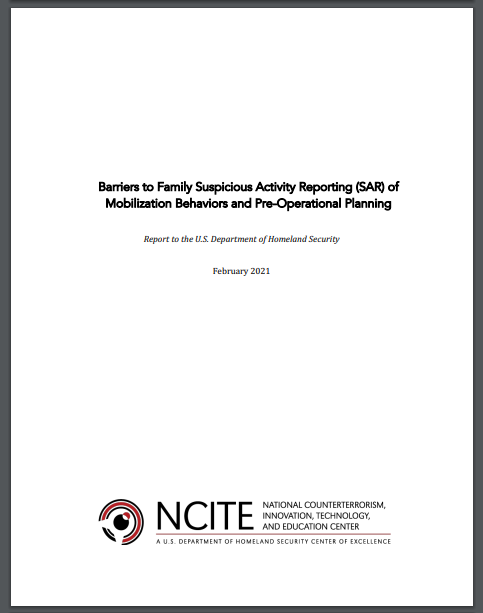 |
Barriers to Family Suspicious Activity Reporting (SAR) of Mobilization Behaviors and Pre-Operational PlanningKaryn Sporer, University of Maine This report discusses barriers to reporting suspicious activity encountered by family members of violent extremists. |
|
|
NCITE Secures First-Ever Patent for Chatbot TechnologyAfter years of research and design, an NCITE research team has successfully secured a patent for chatbot technology designed to streamline suspicious activity reporting forms. |
 |
Research Project: Building an Intelligent Chatbot to Aid in Suspicious Activity ReportingJoel Elson and Erin Kearns, University of Nebraska at Omaha Learn more about NCITE's suspicious activity reporting chatbot. |
Podcast Episodes
NCITE Insights No. 18
NCITE Director Gina Ligon, Ph.D., discusses the New Year's Day attack in New Orleans, including the difference between directed and inspired attacks, the use of vehicles as a weapon, the persisting influence of the Islamic State, and NCITE research on behavioral threat assessment and management.
NCITE Insights No. 19
NCITE Senior Scientist and Director of Academic Research Sam Hunter, Ph.D., discusses the use of Meta's smart glasses in planning the attack and how it reflects a broader trend of terrorists embracing new technologies.
Disclaimer: The views and conclusions contained in this podcast are those of the authors and should not be interpreted as necessarily representing the official policies or views, either expressed or implied, of the U.S. Department of Homeland Security, the University of Nebraska, or guest-affiliated institutions.
Listen and subscribe to NCITE Insights on major podcast platforms:
